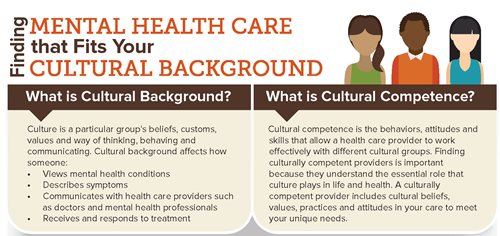
What Is Cultural Background?
Culture is a particular group’s beliefs, customs, values and way of thinking, behaving and communicating. Cultural background affects how someone:
- Views mental health conditions
- Describes symptoms
- Communicates with health care providers such as doctors and mental health professionals
- Receives and responds to treatment
What Is Cultural Competence?
Cultural competence is the behaviors, attitudes and skills that allow a health care provider to work effectively with different cultural groups. Finding culturally competent providers is important because they understand the essential role that culture plays in life and health. A culturally competent provider includes cultural beliefs, values, practices and attitudes in your care to meet your unique needs.
Tips For Finding A Culturally Competent Provider
Research Providers
- Contact providers or agencies from your same cultural background or look for providers and agencies that have worked with people who have a similar cultural background.
- Ask trusted friends and family for recommendations.
- Look online or ask for referrals from cultural organizations in your community.
- If you have health insurance, ask the health plan for providers that fit your cultural background.
Ask Providers These Questions
- Are you familiar with my community’s beliefs, values and attitudes toward mental health? If not, are you willing to learn about my cultural background and respect my perspective?
- Do you have experience treating people from my cultural background?
- Have you had cultural competence training?
- Are you or members of your staff bilingual?
- How would you include aspects of my cultural identity, such as age, faith, gender identity or sexual orientation, in my care?
Other Things You Can Do
- Tell the provider about traditions, values and beliefs that are important to you.
- Tell the provider what role you want your family to play in your treatment.
- Learn about your condition, particularly how it affects people from your culture or community.
- Look around the provider’s office for signs of inclusion. Who works there? Does the waiting room have magazines, signs and pamphlets for you and your community?

